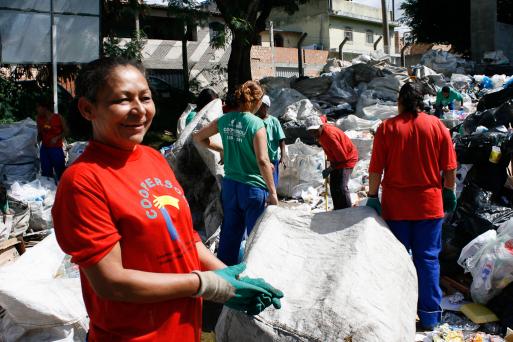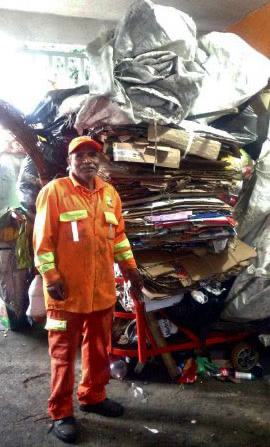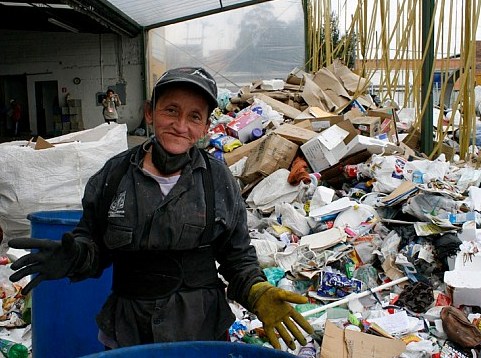Waste pickers collect, sort, recycle, and sell materials that others have thrown away. They benefit urban health and sanitation, lower municipal costs and fill gaps in municipal services─all contributing to a more sustainable urban environment. Yet waste pickers face challenges in protecting their rights: repressive regulatory regimes, societal discrimination, economic insecurity, and heightened health and safety risks.

Legal Context
Waste pickers in many places have formed collectives to advocate for their rights to inclusion in municipal planning. In a few cities, particularly in Colombia and Brazil, waste pickers now have the right to sell to or bid on contracts with the municipality.
Despite hard-won advances, significant legal and regulatory challenges remain. In many cities, waste pickers lack formal recognition and may work at the whim of local officials. The services that waste pickers provide, and the support they require to provide those services, may not be accounted for in municipal planning. And, like workers in many sectors of the informal economy, waste pickers are generally excluded from social protection schemes. That's problematic because of the heightened health and safety risks that they face.
The resources on this site will help waste pickers and their organizations, as well as lawyers, researchers, advocates and policymakers, understand some of the legal challenges around waste picking and some models for addressing those challenges.
Highlights:
Mexico City’s Human Rights Commission (CDHDF) Issues Recommendation

In July of 2016, Mexico City’s Human Rights Commission (CDHDF) issued Recommendation 7/2016, which recognizes that the right of informal waste pickers to decent work is currently being violated in the city. It is the first official document to place on record the discrimination, exploitation and abuse they suffer. Specifically, the recommendation highlights the shortcomings of the city’s public waste management system, and draws attention to the fact that the municipal government is allowing informal workers to provide a public service in in unhealthy and precarious work conditions.
The Commission declares that “The government of Mexico City is neglecting its obligation to respect, protect and guarantee decent work for volunteer workers and informal waste pickers who are part of the free labour force that is essential to the proper operation of the municipal sanitation service in Mexico City.”
The recommendation details ways in which the municipality could promote decent work for informal waste pickers by reducing their risks and increasing their protections and access to resources in the forms of subsidies, scholarships or training, for example. Although the recommendation is not binding and municipal authorities have no obligation to comply, it has established beyond dispute waste pickers’ right to decent work. The recommendation was the result of efforts of WIEGO’s Law Programme, spearheaded by Mexico City Coordinator Tania Espinosa.
Following the release of the recommendation, WIEGO directed a letter to the authorities of the Government of Mexico City, urging them to accept the recommendation. The Latin American Network of Recyclers (RED LACRE)and Bogota Recyclers Association (ARB) also joined WIEGO's call to support recyclers in Mexico City.
Colombian Waste Pickers Organize for Rights and Recognition

In 2011, after years of advocacy by Colombian waste pickers, the Constitutional Court of Colombia ruled that Bogota's waste pickers must be included in municipal sanitation planning. Bogota's waste pickers were subsequently recognized as a providers of a public service and, as of March 2013, paid by the city at fixed rates, established under formal contracts, for the materials that they collect.
In recognition for her leadership role in the ongoing legal campaigns, Nohra Padilla, the president of the Bogata Recyclers' Association who began working as a waste picker in childhood, was awarded the 2013 Goldman Prize, sometimes called the "Green Nobel."
Law Programme Report: Report on the Policy Environment for Informal Urban Waste Pickers in Colombia
UPDATE JUNE 2019: In Colombia, a Global Model for Inclusive Recycling is under Threat
Legal Frameworks Governing Waste Picking
- Brazil: Legal Framework for Solid Waste Management (specific laws, in Portuguese: Decreto No. 7405 (2010) on social inclusion of recyclers; Lei No. 12.305 (2010) instituting the National Policy on Solid Waste Disposal)
Court Cases on Waste Picking
- India: High Court Case on Solid Waste Collection and Handling (SWaCH) Cooperative Championed by KKPKK
- Nov. 2012: Alliance of Indian Waste Pickers Update
- India: 2009 SEWA Public Interest Litigation to Appoint a Committee for the Development of a National Framework for Waste Pickers
